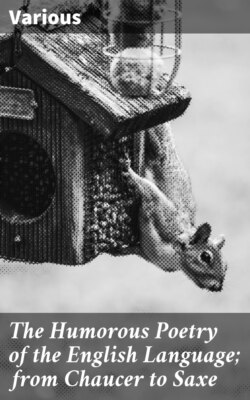Читать книгу The Humorous Poetry of the English Language; from Chaucer to Saxe - Various - Страница 62
На сайте Литреса книга снята с продажи.
FLATTERY. A FABLE. SIR CHARLES HANBURY WILLIAMS.
ОглавлениеTable of Contents
Fanny, beware of flattery,
Your sex's much-lov'd enemy;
For other foes we are prepar'd,
And Nature puts us on our guard:
In that alone such charms are found,
We court the dart, we nurse the hand;
And this, my child, an Aesop's Fable
Will prove much better than I'm able.
A young vain female Crow,
Had perch'd upon a pine tree's bough,
And sitting there at ease,
Was going to indulge her taste,
In a most delicious feast,
Consisting of a slice of cheese.
A sharp-set Fox (a wily creature)
Pass'd by that way
In search of prey;
When to his nose the smell of cheese,
Came in a gentle western breeze;
No Welchman knew, or lov'd it better:
He bless'd th' auspicious wind,
And strait look'd round to find,
What might his hungry stomach fill,
And quickly spied the Crow,
Upon a lofty bough,
Holding the tempting prize within her bill.
But she was perch'd too high,
And Reynard could not fly:
She chose the tallest tree in all the wood,
What then could bring her down?
Or make the prize his own?
Nothing but flatt'ry could.
He soon the silence broke,
And thus ingenious hunger spoke:
"Oh, lovely bird,
Whose glossy plumage oft has stirr'd
The envy of the grove;
Thy form was Nature's pleasing care,
So bright a bloom, so soft an air,
All that behold must love.
But, if to suit a form like thine,
Thy voice be as divine;
If both in these together meet,
The feather'd race must own
Of all their tribe there's none,
Of form so fair, of voice so sweet.
Who'll then regard the linnet's note,
Or heed the lark's melodious throat?
What pensive lovers then shall dwell
With raptures on their Philomel?
The goldfinch shall his plumage hide,
The swan abate her stately pride,
And Juno's bird no more display
His various glories to the sunny day:
Then grant thy Suppliant's prayer,
And bless my longing ear
With notes that I would die to hear!"
Flattery prevail'd, the Crow believ'd
The tale, and was with joy deceiv'd;
In haste to show her want of skill,
She open'd wide her bill:
She scream'd as if the de'el was in her
Her vanity became so strong
That, wrapt in her own frightful song,
She quite forgot, and dropt her dinner,
The morsel fell quick by the place
Where Reynard lay,
Who seized the prey
And eat it without saying grace.
He sneezimg cried "The day's my own,
My ends obtain'd
The prize is gain'd,
And now I'll change my note.
Vain, foolish, cheated Glow,
Lend your attention now,
A truth or two I'll tell you!
For, since I've fill'd my belly,
Of course my flattry's done:
Think you I took such pains,
And spoke so well only to hear you croak?
No, 'twas the luscious bait,
And a keen appetite to eat,
That first inspir'd, and carried on the cheat
'Twas hunger furnish'd hands and matter,
Flatterers must live by those they flatter;
But weep not, Crow, a tongue like mine
Might turn an abler head than thine;
And though reflection may displease,
If wisely you apply your thought,
To learn the lesson I have taught,
Experience, sure, is cheaply bought,
And richly worth a slice of cheese."
